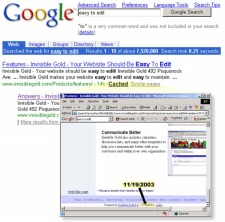261 Broad Street
Windsor, CT 06095
(860) 285-0172
support@invisiblegold.com
Your Website Should Be Easy to Edit
Windsor, CT 06095
(860) 285-0172
support@invisiblegold.com
Your Website Should Be Easy to Edit
The Truth About Search Engines
This article answers common questions about search engines. Check back next month for a companion article discussing the myths of website traffic. |
What is a Search Engine?
What Are Keywords?
How Do I Get Listed?
How To Tell When You Were Last Indexed?
How Do I Get A Good Rank?
How Many Search Engines Are There?
Is There Anything Else I Can Do?
What About Links and Link Popularity?
Food For Thought
Are Search Engines Worth It?
How To Tell When You Were Last Indexed?
If you search for your website's address (ex: www.invisiblegold.com) it won't show the cache link. You'll need to choose words that the page contains instead. Also, your site won't come up if the site hasn’t been indexed yet. It takes 4-6 weeks for a new website to show up in the index. |
How Do I Get A Good Rank?Most people won't look past the first 10 or 20 sites returned, so you need to be on that first page. There are fortunes won and lost in this game and enough "magic" solutions to drain your bank account. You're best off hiring a professional. However, first of all, you need to make sure your website is optimized for search engine traffic. Most editable websites are not. Actually most websites in general are not. Invisible Gold was designed from the start to work well with Search Engines so even if you do nothing else, you will probably do quite well in the search engines. (Contact us if you would like help in planning a search engine campaign.) Second, you need to really focus on your content. Choose a good title for each page, mention your keywords several times and make sure there is enough content for someone to sit down and learn something. Try to minimize banner ads, popups, hidden text, or any other of the tricks. Search Engines are pretty smart and will just lower your rank if they notice you trying to be sneaky. |
Is There Anything Else I Can Do?While you are waiting for the major search engines to index your site, you should submit it to DMOZ.org. It's really a directory or list of websites - but for every submission, someone actually reviews the site. The backlog is long: 3-4 months. Major search engines use it as a reference and it costs nothing so go ahead and submit a listing to it. Be sure to get the text right the first time, as it will be very difficult to get it updated. Yahoo has something similar, however they charge you quite a bit of money to get listed. People debate whether it is worthwhile. If you have the money to spend, it makes more sense to hire a search engine expert to explore your goals and recommend site updates. They might even submit it to Yahoo as part of the process. |
What About Links and Link Popularity?One of the ways search engines evaluate your site is by counting the number of links pointing to it. You've probably seen offers where people link to your site or trade links, etc. The smart search engines punish websites that are listed on "link farms". These are websites that seem to exist for no other reason than to link to other sites. A rare few can be useful if they send visitors your way. However, if it is just to increase search engine rank, then there is almost no reason to be listed - and definitely no reason to pay. There are several free online services that calculate your link popularity. One of the easiest methods is to simply go to Google and type in “link: and your website”. (ex: link:www.invisiblegold.com) Then look for the count count of pages returned. marketleap.com has a nice tool for comparing your link popularity with your competitors' sites. Just keep in mind that your usually better off focusing on your content than worrying about things like link popularity. |
Food For ThoughtA recent report found that “499 out of 500 sites” on the Internet is invisible to the search engines (often called the Invisible Web). These are primarily database-backed and editable sites and the problem is in the way they use addresses. Bad: www.somesite.com/index.php?category=news Good: www.invisiblegold.com/news Search engines shy away from addresses with question marks and thus these sites just won't show up. |


